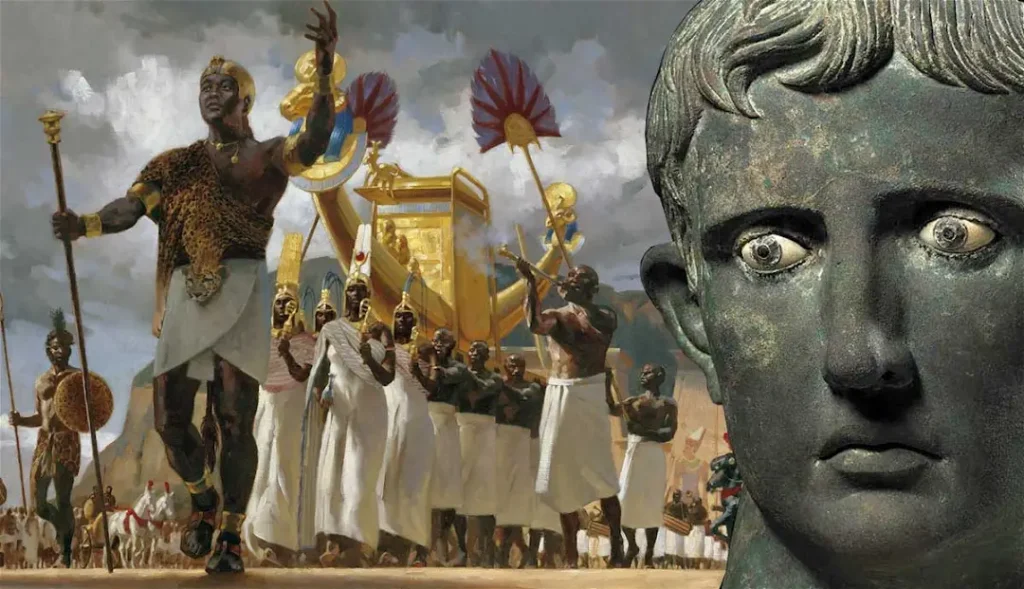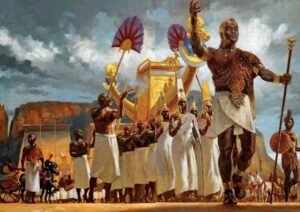The Kingdom of Kush is one of those ancient civilizations that often gets overshadowed by its more famous neighbor, Egypt. But trust me, Kush is just as fascinating, with a rich history that's worth exploring. Imagine a powerful kingdom thriving in the harsh deserts of what is now Sudan, with grand pyramids, impressive cities, and a culture all its own. Intrigued? Let's dive into the story of the Kingdom of Kush (c. 1070 BCE–350 CE).
The Birth of a Kingdom

The Kingdom of Kush arose after the decline of the New Kingdom of Egypt around 1070 BCE. Positioned along the Nile River, Kush was ideally located for trade and agriculture. This wasn't just a kingdom of warriors; it was a bustling center of commerce and culture.
Napata: The First Capital
When we talk about Kush, we can't ignore Napata, its first capital. This city was the heart of Kushite culture and politics. Situated at the fourth cataract of the Nile, Napata was a hub for trade between Central Africa and the Mediterranean.
The Rise of the 25th Dynasty
Ever heard of the Pharaohs of the 25th Dynasty of Egypt? Surprise! They were Kushites. In the 8th century BCE, Kushite kings, starting with Piye, conquered Egypt and ruled as pharaohs. This period saw a revival of ancient Egyptian customs and art, blending them with Kushite traditions.
Meroë: The New Capital
Around 590 BCE, the capital moved to Meroë, marking a new era in Kushite history. Meroë, located further south along the Nile, became famous for its iron production. The city was dotted with pyramids—more than Egypt!—and was a center for learning and culture.
Economy and Trade
The Kingdom of Kush had a robust economy. It was rich in natural resources like gold, ivory, and iron, which were highly sought after by neighboring civilizations. The Kushites were also skilled traders, engaging in commerce with Egypt, Greece, Rome, and other African kingdoms.
Religion and Culture
Religion in Kush was a fascinating blend of indigenous beliefs and Egyptian influences. The Kushites worshipped gods like Amun, who was the chief deity, and built grand temples in his honor. They also had their own unique burial customs, as seen in the pyramids of Meroë, which are smaller and steeper than their Egyptian counterparts.
The End of the Kingdom
The Kingdom of Kush eventually declined due to a combination of internal strife, over-exploitation of resources, and external pressures. By 350 CE, the kingdom had faded, giving way to new powers in the region.
Places to Know
- Napata: The first capital, known for its grand temples and pyramids.
- Meroë: The later capital, famous for its iron production and distinctive pyramids.
- Jebel Barkal: A holy mountain near Napata, considered the home of the god Amun.
- Kerma: One of the earliest cities of the Kushite civilization, predating Napata.
Frequently Asked Questions
Q: What was the Kingdom of Kush known for? A: The Kingdom of Kush was known for its powerful rulers, rich culture, grand pyramids, and robust trade economy.
Q: How did the Kingdom of Kush influence Egypt? A: The Kingdom of Kush, particularly during the 25th Dynasty, influenced Egypt by reviving ancient traditions and ruling as pharaohs.
Q: What were the main resources of the Kingdom of Kush? A: The main resources included gold, iron, ivory, and other valuable commodities.
Q: Why did the Kingdom of Kush decline? A: The decline was due to a combination of internal strife, resource depletion, and external pressures from other emerging powers.
Conclusion
The Kingdom of Kush (c. 1070 BCE–350 CE) may not be as famous as Egypt, but its contributions to history are undeniable. From the powerful rulers of the 25th Dynasty to the bustling cities of Napata and Meroë, Kush was a beacon of culture and commerce in the ancient world. So next time you think of ancient civilizations, remember the Kingdom of Kush—a true gem of African history.


